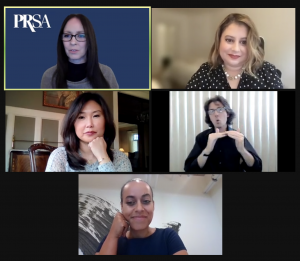A few years ago while serving in an internal communication role for a large Catholic health system, I worked alongside nuns who would sing, “We are standing on the shoulders of those who came before us.” It was a simple reminder that many have paved the road before us, and that it’s our duty to pave it for our peers and for future generations.
This theme rang true during PRSA’s Diverse Dialogues session on March 24 titled “Bringing Your Multicultural Voice as a PR Leader,” a Women’s History Month event moderated by PRSA CCO Karen Mateo that celebrated the importance of lifting up those around you. As a white male and ally to women and diverse communities, and as diversity chair for PRSA’s Orange County Chapter, I’m here to share some insights from the session.
 There was much to glean from the session, which touched on the topics of diversity and workplace equity through the lens of being an ally and mentor. Each panelist lauded the women — and men — who took them under their wing and helped them hone their career paths to overcome the biases that can still affect people of color, women, minorities and youth. Additionally, they discussed how we, as communicators, can add to the dialogue around workplace diversity.
There was much to glean from the session, which touched on the topics of diversity and workplace equity through the lens of being an ally and mentor. Each panelist lauded the women — and men — who took them under their wing and helped them hone their career paths to overcome the biases that can still affect people of color, women, minorities and youth. Additionally, they discussed how we, as communicators, can add to the dialogue around workplace diversity.
Leaning on mentors and allies
Some of the strongest mentors and allies in my life are women. My mother and grandmothers brought me up to be creative and compassionate, and they allowed me to achieve self-realization of who I am as a gay man. Still other women helped shape my view on the world: Leaders who taught me discipline, core friends who taught me humor and professors who fueled my curiosity.
These values are just a small portion of what it takes to be a communicator. I owe where I am today as a communication leader to a collective upbringing where shared knowledge and unique perspectives formed my individuality.
Similarly, it was mentors who allied with Suzi Kim Scott, communications director, American Public Media Group, by giving her guidance to break the glass and “color” ceilings. “My mentors have taught me things that are crucial to advancement while maintaining one’s integrity, whether it was figuring out how to navigate office politics or how to show up as an Asian woman in an industry that is homogenous,” she said.
For Justine Houston-Brown, APR, account supervisor, Ogilvy, it was her mentors who helped her find a career path that merge two loves — medicine and technology. “Communication career options feel endless, and I found and leaned on the mentors around me to bring all my passions together into a unique career path,” said Houston-Brown, PRSA’s 2022 Western District and chair of PRSA’s Hispanic/Latino Affinity group.
A communicator’s role in DE&I
The panelists also touched on how communicators play key roles in diversity, equity and inclusion (DE&I). Sometimes your organization allies with you; other times, it might be up to you to help create an inclusive space.
I currently work for City of Hope Orange County on a team building a comprehensive cancer research and treatment campus in Irvine, Calif. It’s a place where there are employee resource groups for women, LGBTQIA+, people of color, veterans and others. Here, a DE&I team has a goal is to “infuse DE&I into the DNA” of the organization. I’m lucky to have an organization that paves the road for you and as a communication team member, I can help amplify the messages. Though I know many employers, especially smaller nonprofits, they might not have the same resources.
The panelists shared a few easy ways you can help encourage diverse dialogues even without dedicated DE&I resources at your organization:
- Tap into diverse talent pools to bring in new perspectives.
- Understand the cultures you do business with.
- Help manage perceptions through your communication tactics.
- Perform outreach to multicultural audiences.
- Act as a connector between parties.
But it can’t all fall on the marketing and communication department, or the person of color on staff.
“With darker skin, I know that some people think I’m here for the Black vote and the multicultural vote. We shouldn’t automatically be identified as a DEI officer just by being a person of color, or by speaking other languages. You have to challenge assumptions,” said Leshelle V. Sargent, vice president, communications, Paramount’s MTV Entertainment Group; board of director, vice president for PRSA’s Los Angeles Chapter.
As we look back at Women’s History Month, use this time to reflect on what you can bring to the table in your work and at home.
- Are you being an ally to those who need an extra boost in their career?
- Are you allowing the next generation to stand on your shoulders?
- Are you using those communication skills to encourage diverse dialogues?
The future is yours to decide, and we can learn from the women around us to shape it. You can watch the full recording of the session here.
Nathan Lammers is senior manager, marketing and communication, City of Hope. He is the diversity chair for PRSA’s Orange County Chapter.
[Photo illustration: mediteraneo]

